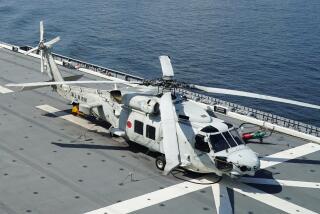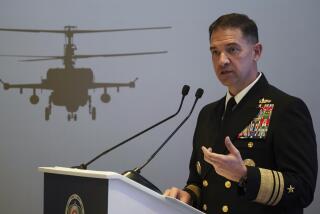Japan Sends Ships to Aid U.S.
- Share via
SASEBO, Japan — Hundreds of Japanese sailors on a small flotilla of warships departed for the Indian Ocean today, making good on Japan’s pledge to support U.S.-led forces in the war against terrorism.
It was Japan’s first military contingent since World War II to be deployed in support of forces involved in combat. Ten years ago Japan agreed to send minesweepers to the Persian Gulf only after the Gulf War was over.
“This mission is a first, but we are trained to be able to respond to whatever contingencies may arise,” Rear Adm. Hirotaka Honda said. “We want to show what we are capable of.”
The mission, which came after weeks of debate in parliament, is controversial: Opponents at home and in Asian nations that suffered the brunt of Japanese militarism during World War II fear that it could be a first step toward loosening constitutional constraints on Japan’s armed forces.
The destroyers Kurama and Kirisame and the supply ship Haman were dispatched under a new law that allows Japan’s Self-Defense Forces to participate in a backup role in the U.S.-led war against terrorism.
The vessels carrying 700 sailors left a Japanese base at Sasebo, 614 miles southwest of Tokyo, shortly before 7 a.m. They will sail through the Strait of Malacca, government and military officials said.
Japan’s navy is expected to transport supplies and fuel for allied forces operating in Afghanistan.
“Ever since the Gulf War, there has been a growing public recognition that Japan has to take some risks and be part of things related to international peacekeeping,” said Gerald Curtis, a visiting researcher at the National Institute for Policy Studies in Tokyo.
Prime Minister Junichiro Koizumi convened his Security Council on Thursday to approve a plan to send the three warships on a reconnaissance mission that will lay the groundwork for dispatching other units.
There is no question of Japanese forces fighting alongside their allies. The new law restricts naval and other units to noncombat missions in areas where hostilities are not expected to take place.
That role was painstakingly scripted by an administration determined to show its commitment to battling terrorism but constrained by an antiwar constitution and bitter memories of Japan’s march through Asia in the first half of the 20th century.
More to Read
Sign up for Essential California
The most important California stories and recommendations in your inbox every morning.
You may occasionally receive promotional content from the Los Angeles Times.











